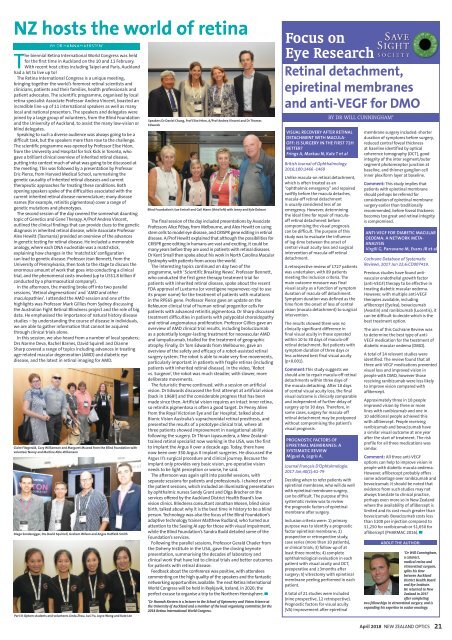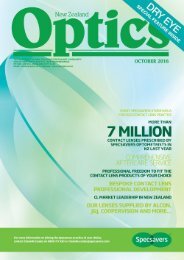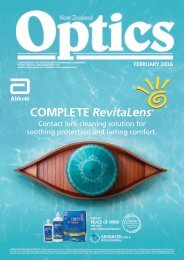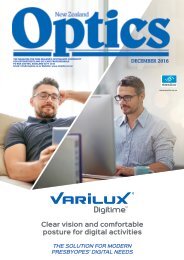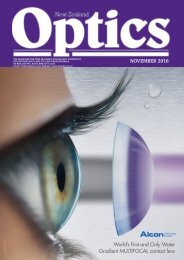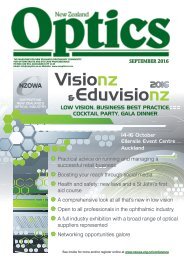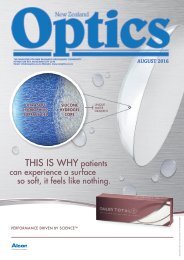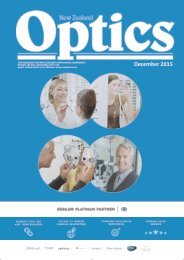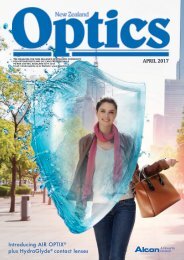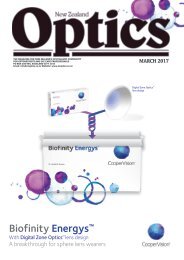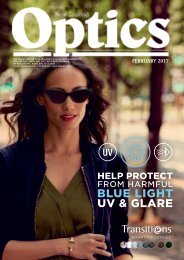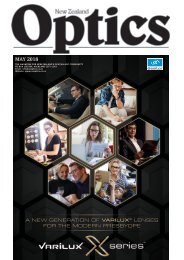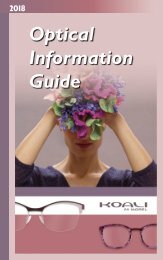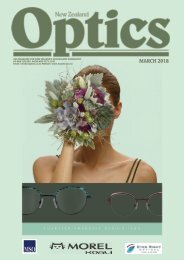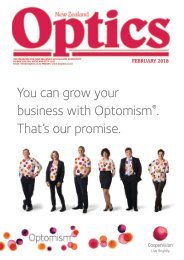Create successful ePaper yourself
Turn your PDF publications into a flip-book with our unique Google optimized e-Paper software.
NZ hosts the world of retina<br />
BY DR HANNAH KERSTEN*<br />
The biennial Retina International World Congress was held<br />
for the first time in Auckland on the 10 and 11 February.<br />
With recent host cities including Taipei and Paris, Auckland<br />
had a lot to live up to!<br />
The Retina International Congress is a unique meeting,<br />
bringing together the world’s foremost retinal scientists and<br />
clinicians, patients and their families, health professionals and<br />
patient advocates. The scientific programme, organised by local<br />
retina specialist Associate Professor Andrea Vincent, boasted an<br />
incredible line-up of 11 international speakers as well as many<br />
local and national presenters. The speakers and delegates were<br />
joined by a large group of volunteers, from the Blind Foundation<br />
and the University of Auckland, to assist the many low-vision or<br />
blind delegates.<br />
Speaking to such a diverse audience was always going to be a<br />
difficult task, but the speakers more than rose to the challenge.<br />
The scientific programme was opened by Professor Elise Héon,<br />
from the University and Hospital for Sick Kids in Toronto, who<br />
gave a brilliant clinical overview of inherited retinal disease,<br />
putting into context much of what was going to be discussed at<br />
the meeting. This was followed by a presentation by Professor<br />
Eric Pierce, from Harvard Medical School, summarising the<br />
genetic causality of inherited retinal diseases and current<br />
therapeutic approaches for treating these conditions. Both<br />
opening speakers spoke of the difficulties associated with the<br />
current inherited retinal disease nomenclature; many disease<br />
names (for example, retinitis pigmentosa) cover a range of<br />
genetic mutations and phenotypes.<br />
The second session of the day covered the somewhat daunting<br />
topic of Genetics and Gene Therapy. A/Prof Andrea Vincent,<br />
outlined the clinical findings that can provide clues to the genetic<br />
diagnosis in inherited retinal disease, while Associate Professor<br />
Alex Hewitt (Tasmania) provided an overview of the advances<br />
in genetic testing for retinal disease. He included a memorable<br />
analogy, where each DNA nucleotide was a matchstick,<br />
explaining how changes in the ‘matchstick’ configuration<br />
can lead to genetic disease. Professor Jean Bennett, from the<br />
University of Pennsylvania, then took to the stage to discuss the<br />
enormous amount of work that goes into conducting a clinical<br />
trial, and the phenomenal costs involved (up to US$1.8 billion if<br />
conducted by a pharmaceutical company!).<br />
In the afternoon, the meeting broke off into two parallel<br />
sessions, ‘Retinal degenerations’ and ‘AMD and other<br />
maculopathies’. I attended the AMD session and one of the<br />
highlights was Professor Mark Gillies from Sydney discussing<br />
the Australian Fight Retinal Blindness project and the role of big<br />
data. He emphasised the importance of natural history disease<br />
studies – by understanding the course of disease in individuals,<br />
we are able to gather information that cannot be acquired<br />
through clinical trials alone.<br />
In this session, we also heard from a number of local speakers;<br />
Drs Narme Deva, Rachel Barnes, David Squirell and Dianne<br />
Sharp covered a range of topics including advances in treating<br />
age-related macular degeneration (AMD) and diabetic eye<br />
disease, and the latest in retinal imaging for AMD.<br />
Claire Fitzgerald, Gary Williamson and Margaret McLeod from the Blind Foundation with<br />
volunteer Nancy and Martine Able-Willamson<br />
Diego Sonderegger, Drs David Squirrell, Graham Wilson and Angus Hatfield-Smith<br />
Part III Optom students and volunteers Linda Zhou, Lusi Yu, Joyce Wong and Kate Lee<br />
Speakers Dr Daniel Chung, Prof Elise Héon, A/Prof Andrea Vincent and Dr Thomas<br />
Edwards<br />
Blind Foundation’s Sue Emirali and Gail Mann (third left) with Jenny and Kyle Dobson<br />
The final session of the day included presentations by Associate<br />
Professors Alice Pébay, from Melbourne, and Alex Hewitt on using<br />
stem cells to model eye disease, and CRISPR gene editing in retinal<br />
disease. A/Prof Hewitt explained that although the possibilities for<br />
CRISPR gene editing in humans are vast and exciting, it could be<br />
many years before they are used in patients with retinal diseases.<br />
Dr Kent Small then spoke about his work in North Carolina Macular<br />
Dystrophy with patients from across the world.<br />
The interesting topics continued on day two of the<br />
programme, with ‘Scientific Breaking News’. Professor Bennett,<br />
who conducted the first gene therapy treatment trial for<br />
patients with inherited retinal disease, spoke about the recent<br />
FDA approval of Luxturna (or voretigene neparvovec-rzyl to use<br />
its proper name) for the treatment of patients with mutations<br />
in the RPE65 gene. Professor Pierce gave an update on the<br />
ReNeuron clinical trial of human retinal progenitor cells for<br />
patients with advanced retinitis pigmentosa. Dr Sharp discussed<br />
treatment difficulties in patients with polypoidal choroidopathy<br />
and retinal angiomatous proliferation. Professor Gillies gave an<br />
overview of AMD clinical trial results, including brolucizumab<br />
as a potentially longer-lasting treatment for neovascular AMD<br />
and lampalizumab, trialled for the treatment of geographic<br />
atrophy. Finally, Dr Tom Edwards from Melbourne, gave an<br />
overview of the safety and efficacy of a robot-assisted retinal<br />
surgery system. The robot is able to make very fine movements,<br />
particularly important in patients with fragile retinas (including<br />
patients with inherited retinal disease). In the video, ‘Robot<br />
vs. Surgeon’, the robot was much steadier, with slower, more<br />
deliberate movements.<br />
The futuristic theme continued, with a session on artificial<br />
vision. Dr Edwards discussed the first attempt at artificial vision<br />
(back in 1968!) and the considerable progress that has been<br />
made since then. Artificial vision requires an intact inner retina,<br />
so retinitis pigmentosa is often a good target. Dr Penny Allen<br />
from the Royal Victorian Eye and Ear Hospital, talked about<br />
Bionic Vision Australia’s suprachoroidal retinal prosthesis, and<br />
presented the results of a prototype clinical trial, where all<br />
three patients showed improvement in navigational ability<br />
following the surgery. Dr Thiran Jayasundera, a New Zealandtrained<br />
retinal specialist now working in the USA, was the first<br />
to implant the Argus II over a decade ago. Today, there have<br />
now been over 350 Argus II implant surgeries. He discussed the<br />
Argus II’s surgical procedure and clinical journey. Because the<br />
implant only provides very basic vision, pre-operative vision<br />
needs to be light perception or worse, he said.<br />
The afternoon was again split into parallel sessions, with<br />
separate sessions for patients and professionals. I chaired one of<br />
the patient sessions, which included an illuminating presentation<br />
by ophthalmic nurses Sandy Grant and Olga Brocher on the<br />
services offered by the Auckland District Health Board’s low<br />
vision clinics. Blindness consultant Jonathan Mosen, blind since<br />
birth, talked about why it is the best time in history to be a blind<br />
person. Technology was also the focus of the Blind Foundation’s<br />
adaptive technology trainer Matthew Rudland, who turned our<br />
attention to the Seeing AI app for those with visual impairment,<br />
while the Blind Foundation’s Sandra Budd detailed some of the<br />
Foundation’s services.<br />
Following the parallel sessions, Professor Gerald Chader from<br />
the Doheny Institute in the USA, gave the closing keynote<br />
presentation, summarising the decades of laboratory and<br />
clinical work that have led to clinical trials and better outcomes<br />
for patients with retinal disease.<br />
Feedback about the conference was positive, with attendees<br />
commenting on the high quality of the speakers and the fantastic<br />
networking opportunities available. The next Retina International<br />
World Congress will be held in Reykjavik, Iceland, in 2020; the<br />
perfect excuse to organise a trip to the Northern Hemisphere. ▀<br />
*Dr Hannah Kersten is a lecturer in the School of Optometry and Vision Science at<br />
the University of Auckland and a member of the local organising committee for the<br />
<strong>2018</strong> Retina International World Congress.<br />
Focus on<br />
Eye Research<br />
Retinal detachment,<br />
epiretinal membranes<br />
and anti-VEGF for DMO<br />
VISUAL RECOVERY AFTER RETINAL<br />
DETACHMENT WITH MACULA-<br />
OFF: IS SURGERY IN THE FIRST 72H<br />
BETTER?<br />
Frings A, Markau N, Katz T et al<br />
British Journal of Ophthalmology.<br />
2016;100:1466 -1469<br />
Unlike macula-on retinal detachment,<br />
which is often treated as an<br />
“ophthalmic emergency” and repaired<br />
swiftly before the macula detaches,<br />
macula-off retinal detachment<br />
is usually considered less of an<br />
emergency. However, determining<br />
the ideal time for repair of maculaoff<br />
retinal detachment before<br />
compromising the visual prognosis<br />
can be difficult. The purpose of this<br />
study was to evaluate the influence<br />
of lag-time between the onset of<br />
central visual acuity loss and surgical<br />
intervention of macula-off retinal<br />
detachment.<br />
A retrospective review of 1727 patients<br />
was undertaken, with 89 patients<br />
meeting the inclusion criteria. The<br />
main outcome measure was final<br />
visual acuity as a function of symptom<br />
duration of macula-off detachment.<br />
Symptom duration was defined as the<br />
time from the onset of loss of central<br />
vision (macula detachment) to surgical<br />
intervention.<br />
The results showed there was no<br />
clinically significant difference in<br />
final visual acuity in those operated<br />
within 10 to 30 days of macula-off<br />
retinal detachment. But patients with<br />
symptom duration of three days or<br />
less achieved best final visual acuity<br />
(p


